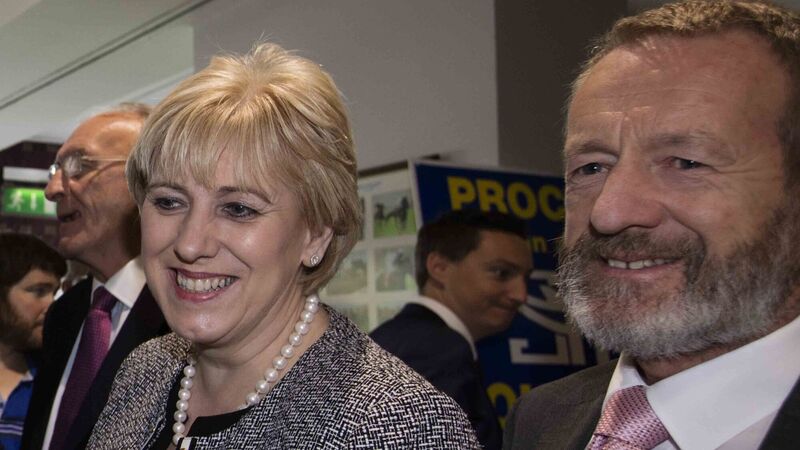Fine Gael system to choose presidential candidate means race could be over before it starts

Heather Humphries (left) has gained a noticeable and potentially insurmountable lead over Sean Kelly (right) in the parliamentary party race. File photo: Eamonn Farrell/RollingNews.ie
At a Fine Gael "special conference" in a Maynooth hotel in 2023, there was a discussion. In the almost labyrinthine Glenroyal Hotel, the party had taken over a number of meeting and conference rooms to host sessions on things like building “stronger, safer communities”.
All there agreed on the need to build stronger and safer communities, you will be shocked to hear, but in a smaller room there was an issue that not everyone could agree on and it's an issue that could prove crucial to the presidential election.
The discussion that day in Maynooth focused on the role of the ordinary member in internal party elections such as for party leadership or, for example, the party's nominee for the presidency. The party has, for a number of years, operated an electoral college system which, it was argued by some members in 2023, vastly outweighs its TDs, senators and MEPs.
Under the current system, the Fine Gael parliamentary party has the most weight, accounting for 65% of the vote, while ordinary members contribute 25% and councillors 10%.

The system was used in 2017 when Leo Varadkar and Simon Coveney went head to head in the race to succeed Enda Kenny, a race Mr Varadkar won despite ordinary members of the party voting heavily in favour of the Cork man, while Mr Varadkar won the majority of elected members' votes.
Mr Varadkar won the race primarily by dominating the parliamentary party vote - gaining 51 of the 73 available votes compared to Mr Coveney's 22 - a 60-40% split.
However, among grassroots members the result was flipped, with Mr Coveney gaining 65.1% of support from just over 10,000 members who voted compared to Mr Varadkar's 34.9%.
With Mr Varadkar narrowly winning the council section of the vote by 55% to 45%, this means there is a marked difference between who the members voted for and who politicians supported.
When Mr Varadkar announced in 2024 that he would depart as Taoiseach, the system was used but never deployed as Simon Harris emerged as the only candidate to become party leader.
Mr Harris was obviously keenly aware of the importance of the parliamentary party's imprimatur and by 7am on the day after Mr Varadkar's announcement, endorsements from across the country were rolling in; Tim Lombard in Cork, Sean Kyne in Galway, Neale Richmond in south Dublin.
The timing and geography and demographics were not accidental and what this paper called a "pre-dawn offensive" had killed off the race before any potential rivals had even begun to consider their positions.
Just before 9am, then MEP Frances Fitzgerald, who acted as a key mentor to the Wicklow man, endorsed Harris. Adding to the female vote of confidence was fellow MEP Maria Walsh. By 10am, when nominations officially opened, Mr Harris had the backing of 15 members and counting.
At lunchtime, journalists had almost stopped recording the tally as Mr Harris had multiples of the nomination quota of six. He had also gone over the magic 20 figure, generally deemed as an unassailable level of support from within the parliamentary party.
While the choreography of Heather Humphreys' presidential bid announcement had not exactly matched the slick production of Mr Harris's ascension to the leadership of the party and the country, she had gained a noticeable and potentially insurmountable lead in the parliamentary party race.
By 11am, she had amassed 11 endorsements to Mr Kelly's two, including himself.
With each member of the parliamentary party worth around 0.93% of the vote, Ms Humphreys was over 10% of the way to the nomination before many people had taken their coffee break.
The Fine Gael system has been criticised internally, but some see it as a failsafe for the kind of internal party insurgency which saw Jeremy Corbyn swept to the British Labour leadership by a resurgent left, which handed a bloody nose to the party's establishment.
By keeping the weight within those already elected, there is little chance of a TD capturing the hearts and minds of the grassroots alone.
Others argue that because the vast majority of those in the parliamentary party have come through selection conventions for their roles, they are already representative of the party's memberships and their mandate is far from undemocratic.
Whatever the arguments for and against, there is no question that the weighting of the parliamentary party makes internal races like this a different spectacle to a straight shootout with local hustings and debates. It becomes somewhat more tactical and, if you're a political anorak, more intriguing as allegiances become clear.
But the system does leave the question of whether there will be a race worth running by the time nominations close or if Mr Kelly can command the 20 members of the parliamentary party required alongside 25 councillors and five members of the party's executive committee.





